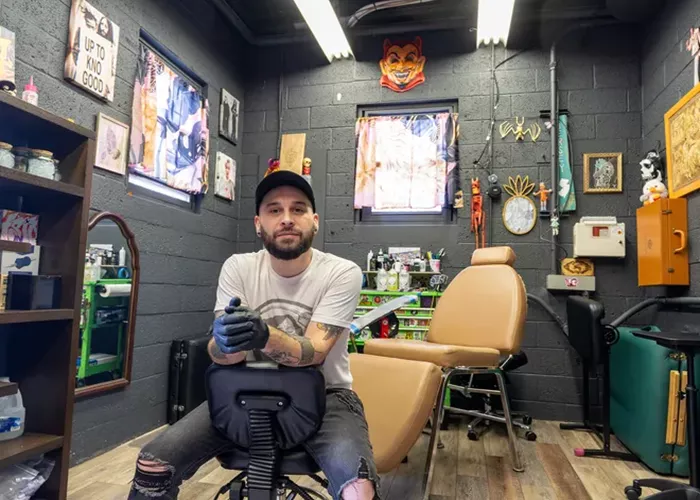Toronto Maple Leafs forward Auston Matthews recently commemorated his standout rookie season with a bold personal statement—not in words or trophies, but with ink. The NHL star, expected to secure the Calder Trophy, unveiled a massive lion tattoo crowned atop his right shoulder, a striking image that quickly gained attention across social media.
While many fans praised the artistry and symbolism—lion for strength, a crown for victory—others questioned the design’s message. Why the crown? Does it imply dominance, royalty, or simply personal empowerment? These debates remain harmless in Toronto, where tattoos have become widely accepted as expressions of individuality and lifestyle.
But 3,600 kilometers south, in El Salvador, the same imagery could mean something very different—and carry life-altering consequences.
Tattoos as Evidence of Crime
In El Salvador, once dubbed the “murder capital of the world,” tattoos have become more than personal art—they are considered potential evidence of gang affiliation. Under President Nayib Bukele’s administration, authorities have implemented a sweeping crackdown on street gangs like MS-13 and 18th Street. Part of that effort includes identifying and arresting individuals based on specific tattoos believed to be gang-related.
Gustavo Villatoro, El Salvador’s Minister of Security and Justice, told CNN that authorities have cataloged and analyzed hundreds of tattoos linked to gang activity. “We learn how to understand, how to give interpretation to each tattoo,” Villatoro said. “If you are not a member, you are not able to use any tattoo.” In the Cecot supermax prison—officially named the Terrorism Confinement Center—body ink is routinely scrutinized for coded meanings.
According to prison director Belarmino García, even symbolic or religious images, such as depictions of Santa Muerte or the Roman numerals “X, V, III,” can indicate gang rank or history. “This isn’t a hunt just because a person has tattoos,” García told CNN. “Authorities are searching for members of terrorist organizations who have specific tattoos that identify them.”
Yet critics argue the line between art and affiliation is dangerously blurred.
Deportation and Misinterpretation
The implications of these associations extend beyond El Salvador’s borders. U.S. authorities have deported individuals—particularly from Venezuela and El Salvador—based on tattoos interpreted as gang-related. Among them is Jerce Reyes, a former Venezuelan soccer player now detained in El Salvador’s Cecot prison. According to legal filings, Reyes has a crown tattoo over a soccer ball—imagery reportedly interpreted as a marker of the Venezuelan criminal group Tren de Aragua.
Reyes’ attorney contends the tattoo was merely a nod to his favorite team, Real Madrid. “My brother has tattoos because he’s an artist, but that doesn’t make him a criminal,” Nelson Suarez told CNN, referencing another detainee with a hummingbird tattoo—mistakenly flagged as suspicious.
Despite these concerns, U.S. and Salvadoran authorities maintain that their assessments go beyond a single design. A Department of Homeland Security official stated that tattoo analysis is only one part of a broader intelligence review.
A Shift in Perception at Home
Ironically, as tattoos remain grounds for arrest in El Salvador’s prisons, they are becoming more accepted in Salvadoran society. Tattoo artists in San Salvador report an uptick in clients, not for gang iconography, but for personal, often artistic, designs.
“Never in the history of this country would you see a guy with tattoos working in a restaurant or in a Walmart,” said Alejandra Angel, a tattooist in the capital. “After they ‘cleaned up’ the country everything has changed.”
Camilo Rodriguez, another artist, recalls being questioned by police during the early days of the crackdown, but said he was released after explaining his designs. “Tattoos are for everyone,” he added. “It’s a very personal language, and you can do whatever you want with it.”
A Symbol Divided by Context
The contrast could not be starker. In Toronto, Matthews’ lion tattoo may spark debate, but it is unlikely to lead to anything more than online speculation. In El Salvador, a lion with a crown—depending on its placement or artistic style—might be interpreted as allegiance to a violent gang and used as grounds for detention.
This divergence underscores a powerful global truth: the meaning of a tattoo is shaped not just by the person who wears it, but by the society that sees it.
As the ink dries on Auston Matthews’ shoulder, the debate over tattoos as art versus tattoos as evidence rages on elsewhere. In one world, they symbolize pride. In another, they are a ticket to prison.
Related topics:

